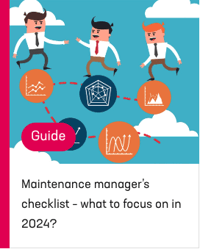
Maintenance is a key productivity driver for manufacturing industry, and one of the pillars of competitiveness. In this article, we have compiled a list of topics that we think maintenance managers or anyone interested in developing maintenance should pay particular attention to in 2024.
This article is based on our research, discussions with our networks during the year, and data collected by the maintenance association Promaint Ry at the beginning of 2023 (n=110).
Note 1: Growing concern about professionals – the maintenance organization needs different roles and responsibilities
The core of maintenance consists of the company’s own maintenance and service staff, the production staff, and any maintenance subcontractors. Skilled and motivated staff are a crucial part of a company’s strategy and success.
Trends that affect the workforce in general are reflected in the way maintenance workers feel about their work, or the expectations they have of their employer. The demand for flexibility keeps appearing as staff assess their work-life balance. At the same time, technology reduces the need for manual work, creating a demand for workers who are skilled with a wide range of technologies. In maintenance, the increasing complexity of electrical and automation systems in particular places demands on skills, and training in the field is not always able to adapt to new needs quickly and effectively enough.
Different maintenance tasks require different skills, and the right roles allow each team member to focus on their strengths and the tasks they do best. Clear responsibilities, for example in work management and work planning, ensure the smoothest daily workflow in maintenance, and significantly improve the overall efficiency of the maintenance organization.
As the amount of specialist work increases, the need for skills in different systems grows. Simultaneously, the number of traditional maintenance tasks is increasing as production facilities become older, but the number of workers decreases as the sector and the attractiveness of the work decreases.
Note 2: Sustainability is an important topic in future maintenance
In 2024, sustainability will no longer be just a buzzword – it will also be a key focus area in maintenance. Environmentally friendly practices, such as energy efficiency and waste management, will be at the heart of decision-making. Maintenance must be sustainable and responsible, and organizations are expected to invest more in renewable energy solutions and ecological materials. Process design and implementation, on the other hand, is more focused on minimizing waste, and optimizing resource use. Sustainability is not only an ethical obligation, but also a means to improve the efficiency and reputation of operations.
In industrial maintenance, safety is also a fundamental principle that strongly guides operations. There is no need to search for its meaning, as health and safety are essential areas of sustainability and human life. More attention will be paid to the training and working conditions of maintenance staff. This not only contributes to the well-being of workers, but also reduces accidents and improves maintenance efficiency.
There is more of an effort to repair and refurbish than to replace. More attention is being paid to the maintainability of machinery and equipment right from the design stage.
Note 3: There’s a lot of talk about AI – and rightly so
In 2024, industrial maintenance will take another step closer to smart solutions and artificial intelligence. In the future, AI helps improve predictability, and reduce unforeseen equipment failures. Equipment health can be monitored in real time, and AI can analyze this data to detect deviations from normal operation. In the future, machines may be able to optimize their performance, and inform you when maintenance is needed.
The three stages of AI development in maintenance:
- The system (e.g. CMMS) draws conclusions from existing data, and can make suggestions to the user
It can rarely be called a true AI, but rather one that is based on functions that make things easier for the user. It controls, for example, the use of the system or the collection and management of data. It’s a familiar feature from most systems from years ago. - Benefits based on current operations, achievable with reasonable effort
It requires a willingness and interest from the company to develop its operations and adopt new operating models. It could be, for example, optimizing maintenance intervals or predicting material requirements using artificial intelligence. AI can take into account historical data and, for example, possible delivery times or delays.
A particularly useful feature in resource planning, for example, is that the system can consider, for example, upcoming maintenance and resource needs, and make a plan based on that. The user always plays a crucial role as decision-maker and implementer of the plans. - Smart and flexible model for the future
It strongly represents the future of maintenance, where artificial intelligence is integrated into the daily work. AI no longer only analyzes past data and optimizes current operations, but also predicts future needs. It can be used to compile a range of intelligent forecasts as self-learning systems improve their performance over time, and provide more accurate predictions and solutions.
With the help of an intelligent model, maintenance can better adapt to changing conditions, react to disruptions, and anticipate potential problems. The role of the user shifts from monitoring and reacting to strategic planning and decision-making.
Before AI can be deployed, it is essential to build a strong foundation for operations, both at the system level and in commonly agreed operating models. Maintenance AI solutions rely mainly on machine learning and data analytics. It is therefore crucial to understand that preparation starts with ensuring that sufficient real-time, high-quality data is available. High-quality data is the key to enabling the success of AI. Careful groundwork ensures that the use of AI really adds significant value to operations.
Are you interested?
We’ve put together a maintenance manager’s checklist of topics we think you should pay particular attention to in 2024. We’ve listed issues relevant to the development of maintenance, such as artificial intelligence, maintenance management system, and KPIs. Download the guide.
Read more:
Blog: How is maintenance data refined into additional value for business operations and decision-making?
Blog: From an expense to a productivity driver – how to ensure the future success of maintenance?
Novi by Pinja - maintenance system

Juha Nyholm
I work as a Sales Manager at Pinja, working on maintenance solutions. I have a long history of working with industry. I spend my free time in my own and my children’s sports activities, including basketball.
Back to the Pinja Blog
Categories
- Career at Pinja (68)
- Manufacturing (48)
- Knowledge Management (45)
- Production Development (44)
- Software Partnership & Tools (42)
- Sustainability (37)
- Wood and Forestry (37)
- Bioenergy and Recycling (27)
- IT Support and Outsourcing (24)
- Ecommerce (23)
- Maintenance (22)
- Artificial Intelligence and Machine Learning (15)
- Public Services (9)
- Compliance (1)
